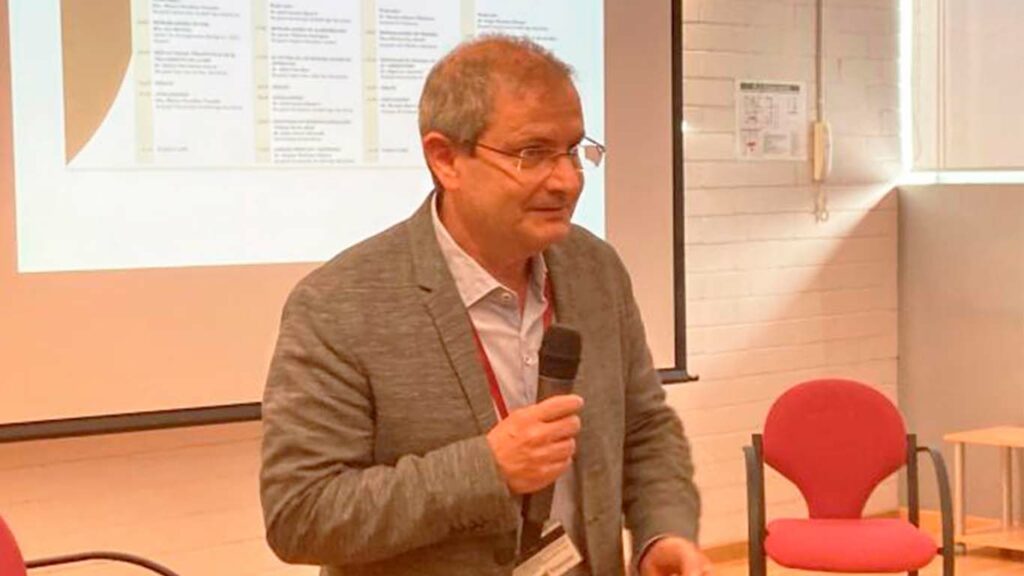The first block, led by Dr. Mònica Povedano, principal investigator at IDIBELL and HUB, featured interventions by Dr. Ana Martínez, from the CSIC Center for Biological Research, and Dr. Andrés Nascimento, from San Juan Hospital of God.
Dr. Martínez, a winner of the Juan de la Cierva 2022 award for her contributions to the field of drug design and development for neurodegenerative and infectious diseases, spoke about her work with biomarkers and new therapeutic targets related to the deposit of TDP43, a protein that is secreted abnormally in patients with motor neuron.
Dr. Nascimento provided research and direct clinical experience vision with new gene therapies for spinal muscular atrophy (SMA), which is leading to a change in the treatment of child and adult patients. The evolution of these therapies and other therapeutic targets makes him convinced that progress will continue with this type of disease.
Present and future of Alzheimer’s biomarkers
Alzheimer’s has been the focus of the second block of the NeuroDebat, moderated by Dr. Jordi Gascón, from IDIBELL and HUB, and with the participation of Dr. Javier Olazarán, from the Hospital Gregorio Marañón, in Madrid, and Dr. Albert Lleó, from the Hospital Santa Creu and Sant Pau.
Drs. Olazarán and Lleó spoke about the present and future of diagnostic biomarkers in Alzheimer’s and other dementias. There are imaging biomarkers and biomarkers in the cerebrospinal fluid (CSF). The available image markers are PET (positron emission tomography), divided into two types: one to see if there is neurodegeneration and another that determines if there is an amyloid protein deposit (involved in the pathophysiology of Alzheimer’s disease).
In the case of CSF, the available biomarkers allow us to know if there is amyloid protein and TAU protein in the patient’s brain. However, their power and diagnostic validity will always depend on interpretation. The great value of these biomarkers is that they allow a diagnosis in the early stages of the disease, which can increase the effectiveness of current treatments and those that may come in the future, according to professionals.
Research in migraine and other headaches
Dr. Mariano Huerta, from Viladecans Hospital, moderated the third block of the NeuroDebat, dedicated to headaches.
Dr. Patricia Pozo, from the Vall d’Hebron Hospital, has detailed the current status of migraine biomarkers. She noted that the level of the peptide CGRP is a useful biomarker of migraine, and its levels are higher in chronic migraine than in episodic migraine. The determination of CGRP in saliva has permitted the evaluation of basal levels, which are higher in patients with migraine, and the detection of an increase at the beginning of the migraine attack.
Dr. Angel Luis Guerrero, from the University Hospital of Valladolid, spoke of the relationship between clinical practice and the research laboratory. In clinical headache research, the accurate observation of semiology and asking the right questions are key to characterizing headaches.
The case of multiple sclerosis
The NeuroDebat program closed on November 5 with a session focused on multiple sclerosis (MS), which was led by Dr. Sergio Martínez Yélamos, from IDIBELL and the HUB.
In this block, Dr. M.Luisa Villar, head of the Neuroimmunology Service of the Ramon y Cajal Hospital in Madrid, and Dr. José M. Prieto, head of the Neurology Service of the Santiago University Hospital Complex, discussed the present and future of different biomarkers for the disease.
According to both experts, the determination of light chain neurofilaments in serum could partially replace the use of magnetic resonance imaging for the follow-up of people with MS. They also highlighted its usefulness in objectively evaluating the response to certain treatments.
The Bellvitge Biomedical Research Institute (IDIBELL) is a biomedical research center created in 2004. It is participated by the Bellvitge University Hospital and the Viladecans Hospital of the Catalan Institute of Health, the Catalan Institute of Oncology, the University of Barcelona and the City Council of L’Hospitalet de Llobregat.
IDIBELL is a member of the Campus of International Excellence of the University of Barcelona HUBc and is part of the CERCA institution of the Generalitat de Catalunya. In 2009 it became one of the first five Spanish research centers accredited as a health research institute by the Carlos III Health Institute. In addition, it is part of the “HR Excellence in Research” program of the European Union and is a member of EATRIS and REGIC. Since 2018, IDIBELL has been an Accredited Center of the AECC Scientific Foundation (FCAECC).

